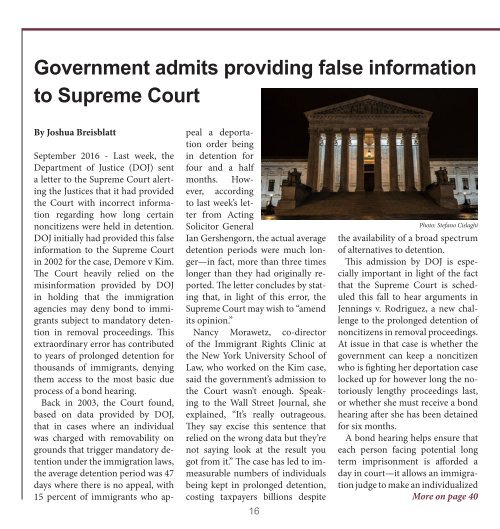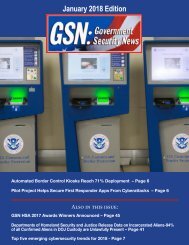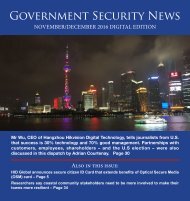GSN_Sep_Final_Yumpu
Create successful ePaper yourself
Turn your PDF publications into a flip-book with our unique Google optimized e-Paper software.
Government admits providing false information<br />
to Supreme Court<br />
By Joshua Breisblatt<br />
<strong>Sep</strong>tember 2016 - Last week, the<br />
Department of Justice (DOJ) sent<br />
a letter to the Supreme Court alerting<br />
the Justices that it had provided<br />
the Court with incorrect information<br />
regarding how long certain<br />
noncitizens were held in detention.<br />
DOJ initially had provided this false<br />
information to the Supreme Court<br />
in 2002 for the case, Demore v Kim.<br />
The Court heavily relied on the<br />
misinformation provided by DOJ<br />
in holding that the immigration<br />
agencies may deny bond to immigrants<br />
subject to mandatory detention<br />
in removal proceedings. This<br />
extraordinary error has contributed<br />
to years of prolonged detention for<br />
thousands of immigrants, denying<br />
them access to the most basic due<br />
process of a bond hearing.<br />
Back in 2003, the Court found,<br />
based on data provided by DOJ,<br />
that in cases where an individual<br />
was charged with removability on<br />
grounds that trigger mandatory detention<br />
under the immigration laws,<br />
the average detention period was 47<br />
days where there is no appeal, with<br />
15 percent of immigrants who appeal<br />
a deportation<br />
order being<br />
in detention for<br />
four and a half<br />
months. However,<br />
according<br />
to last week’s letter<br />
from Acting<br />
Solicitor General<br />
Ian Gershengorn, the actual average<br />
detention periods were much longer—in<br />
fact, more than three times<br />
longer than they had originally reported.<br />
The letter concludes by stating<br />
that, in light of this error, the<br />
Supreme Court may wish to “amend<br />
its opinion.”<br />
Nancy Morawetz, co-director<br />
of the Immigrant Rights Clinic at<br />
the New York University School of<br />
Law, who worked on the Kim case,<br />
said the government’s admission to<br />
the Court wasn’t enough. Speaking<br />
to the Wall Street Journal, she<br />
explained, “It’s really outrageous.<br />
They say excise this sentence that<br />
relied on the wrong data but they’re<br />
not saying look at the result you<br />
got from it.” The case has led to immeasurable<br />
numbers of individuals<br />
being kept in prolonged detention,<br />
costing taxpayers billions despite<br />
16<br />
Photo: Stefano Cislaghi<br />
the availability of a broad spectrum<br />
of alternatives to detention.<br />
This admission by DOJ is especially<br />
important in light of the fact<br />
that the Supreme Court is scheduled<br />
this fall to hear arguments in<br />
Jennings v. Rodriguez, a new challenge<br />
to the prolonged detention of<br />
noncitizens in removal proceedings.<br />
At issue in that case is whether the<br />
government can keep a noncitizen<br />
who is fighting her deportation case<br />
locked up for however long the notoriously<br />
lengthy proceedings last,<br />
or whether she must receive a bond<br />
hearing after she has been detained<br />
for six months.<br />
A bond hearing helps ensure that<br />
each person facing potential long<br />
term imprisonment is afforded a<br />
day in court—it allows an immigration<br />
judge to make an individualized<br />
More on page 40
















